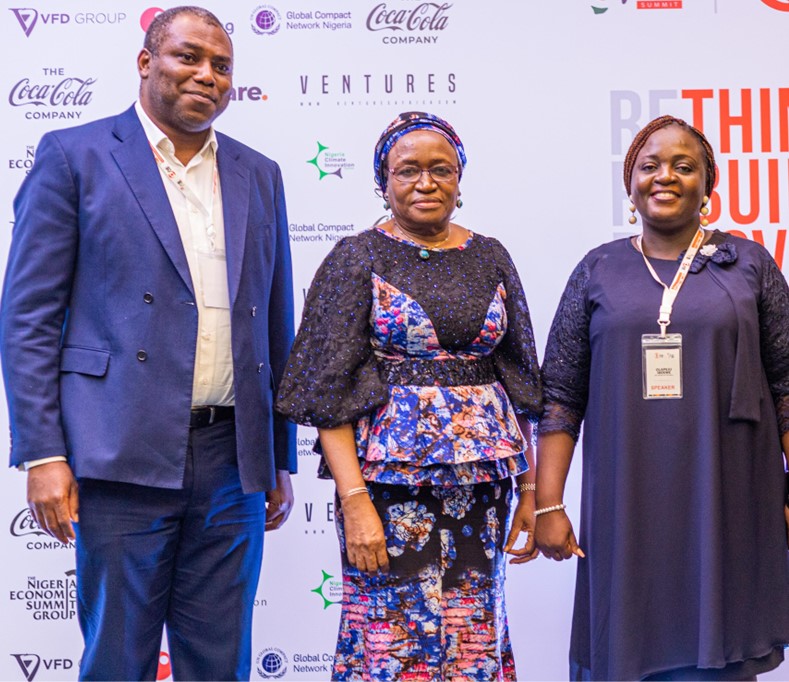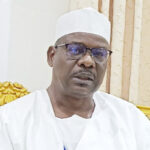Climate change is unarguably the biggest global crisis begging for serious attention in the race to attain the United Nations Sustainable Development Goals by 2030.
With perennial flooding and farmer-herder crisis that have claimed thousands of lives and displaced communities, Nigeria is having a fair share of the debilitating effects of the global crisis.
While the prospect of achieving a climate-friendly environment and other SDGs, including ending hunger and providing education for all, in record time (by 2030) appears bleak, forging strong partnership among all stakeholders – which falls under Goal 17 – has been identified as the needed game changer.
US urges Nigeria to tap into N5trn climate change fund
Nigeria’s out-of-school children rise to 19.7 million – UN
Sterling One Foundation, a social impact non-for-profit-making organisation, is at the forefront of galvanizing cooperation to drive up efforts towards attainment of these goals.
One agenda on the 2022 UN Security Council in New York is the call for greater action on climate change, food security and food strengthening systems especially in Africa, improving inclusivity and global security.
As world leaders tackle the challenges confronting the earth, the focus on Africa is clear: building systems and structures that enable the continent to thrive. The same agenda, which dominated discussions at the UN Security Council in New York, were recently championed in Abuja by Sterling One Foundation and partners from government, civil society and the diplomatic circle under the aegis of The Africa Social Impact Summit (ASIS).
ASIS is a platform for partnership building aimed at facilitating the actualization of the SDGs. At ASIS 2022, participants from 52 African countries were shown grim statistics on the current state of continent and what it might be in the near future, if collaborative action is not taken to end poverty and hunger; ensure good health and well-being of all; guarantee quality education; mainstream gender equality, make sure the environment is clean and liveable; provide clean water, affordable and clean energy; foster decent work and economic growth and ensure appropriate action on climate change.
These are among 17 ambitious but attainable sustainable development goals at the core of which is the 17th Goal: Partnerships for Goals, the coordinating component which calls for actions, active participation, collaborations and joint efforts from governments, businesses and relevant organisations.
“One of the things we find is that organizations are working in silos; that must change,” Olapeju Ibekwe, Sterling Foundation lead, told the ASIS audience.
Olapeju challenged corporate organisations, NGOs and businesses to forge a united front in order to actualise the SDGs within the 2030 time frame, urging for serious partnership and an end to ‘one-man-show-ship.’
Investments in education and health topped the agenda of the summit. In Africa, the gap in education investment is so wide and requires booths-on-the-ground action.
The United Nations Educational, Scientific and Cultural Organization (UNESCO) reveals that “Sub-Saharan Africa has the highest rates of education exclusion, over one-fifth of children between 6 and 11 years are out of school, followed by one third of the youths between ages 12 and 14,” adding that “according to UIS data, almost 60 per cent of youths between ages 15 to 17 are not in school.”
By interpretation of the UNESCO data, more than 42million children from Sub-Saharan Africa are not in school; 18.5million of the out-of-school children are in Nigeria.
“If urgent actions and partnerships are not built, the demand for educating the growing young population will keep rising and widening,” Ibekwe warned, noting that the gap in the educational sector can be closed faster when innovations in the education space are funded to provide access to quality education for children in any location they live.
“This is one of the reasons why at Sterling One Foundation, we support innovative ideas. We support ideas that can bridge the gap to make Africa reach the goals faster,” she said.
Africa is still a long way from achieving the goals on education and health. An African child is still at risk of not receiving quality education and decent healthcare. Hence, there is much to be done on the continent despite financial commitment of United Nations agencies and international organizations.
Collaborating for development
Experts believe that reaching the SDGs can only be near feasible in Africa if organizations form united fronts, unify strategies and sustain collaboration.
The United Nations Resident Coordinator in Nigeria, Mathias Schmale, points to the urgency of collaborations, while calling on organizations to ensure policy inclusivity.
“We must take a fresh look at how best to support the most vulnerable on this continent; like youth, women and girls face many challenges in reaching their potentials.
“As it stands, Nigeria unfortunately, is not on track to reach many of its SDGs by 2030; a situation compounded by the COVID-19 pandemic and the war in Ukraine. The same is true across many African countries,” Schmale said.
“We need to be more deliberate with our collaborative efforts to channel investments into educational development. If we are going to achieve impact and scale, we have to let go of competitiveness,” Adetomi Soyinka, Director of Programmes and Regional Director, Higher Education, British Council, advised.
One critical driver of Africa’s development is the need to invest in the continent’s youthful population. It is believed that Africa has the youngest population in the world; this should be viewed as smart social investment and a huge opportunity.
However, with a dearth of investment in the youthful talents, Africa’s young population could turn to a huge liability – a reason ASIS 2022 focused an entire session in formulating development templates for investment in education and health, two critical enablers which can unlock talents of young people.
“The African youth collectively are Africa’s greatest natural resource. The potential of our youths must be nurtured and cultivated” said the UN Resident Coordinator in Nigeria.
Co-founder of Co-Creator Hub, Bosun Tijani drives home the point, saying “the biggest driver of economic prosperity in the world is talent. Nigeria is blessed to have a lot of young people who are inclined to contribute to our economic development.”
No region or geographical location should be left out of the inclusive development plan; rural or urban, all parts of the continent need integral system to ensure equal opportunities:
“We should focus on collaborations and set agendas that impact the development of a rural and urban youth,” Ibekwe noted.
If the SDG must come to fruition, the participation of governance and policy must be proactively active, Sarah Alade, the special adviser to the President on Finance and Economy posited.
“I like that we currently have a lot of independent actors in our youth development, but we also need a lot of cooperation with the government to make a greater difference. In preparing for Nigeria’s Agenda 2050, the youths have an important role to play to be able to share their ideas with the government to make a change in the country,” she added.
According to the United Nations Conference on Trade and Development, a yearly investment of $3.9 trillion is required from public and private sector in developing countries alone to achieve SDGs. The public sector alone does not have the financial capacity to fund the actions and investments required to achieve the goals.
“This is why the Sterling One Foundation is at the forefront of galvanizing necessary collaborations and participations of the private sector to invest in social ideas and business concerns that can move the needle closer to SDG attainment in Africa,” Ibekwe futher disclosed.
At the Africa Social Impact Summit, Sterling One Foundation engaged start-ups businesses from Nigeria, Namibia, Kenya and Ghana to pitch their business ideas to a select team of investors.
“The idea of the deal room is to put funds into social ideas that can quickly scale, be expanded and targeted specifically at providing solutions to health, education, environment and climate change as critical enablers to meeting the SDG,” Ibekwe said.
Following China, India’s path
The rise of China and India over the last three decades has been built on the principles of the Millennium Development Goals. While Africa struggled to catch up with the content of the goals, China and India laced the groundwork of their development with the spirit and principles of the goals.
The result is what is visible to the world; China and India, once known and referred to as densely populated countries with extreme poor people are now leading the world in trade and technology.
Notably, China and India did not rise alone; they built strategic partnerships, leveraged cooperation, globalization and alliances to expand their trade and extend their technology, thereby lifting a mass of their population out of poverty. Seeing the dividends of partnerships, China is still aggressively extending its economic influence across Africa.
Partnership building is one of the big missing links to the attainment of the Millennium Development Goals. It is a critical component which drives and coordinates other goals. Now, incorporated into the Sustainable Development Goals, partnership is the most critical requirement for achieving the SDGs.
Partnership building formed the critical element of the Africa Social Impact Summit whose overaching message reinforces the fact that little progress can be made in reaching the SDGs if partnership is not integrated into organizations, government policies, programming and implementations.

 Join Daily Trust WhatsApp Community For Quick Access To News and Happenings Around You.
Join Daily Trust WhatsApp Community For Quick Access To News and Happenings Around You.


